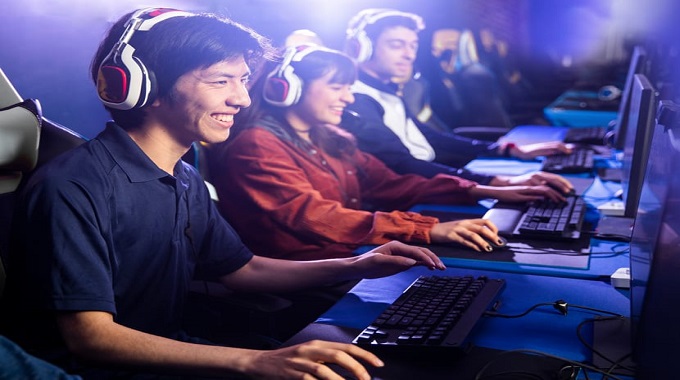Ready, player one: In Asia, e-sports is shaping up to be the next big thing

Carlos Alimurung recalls the series of events that cemented his belief that e-sports was morphing into the next juggernaut. It was the late noughties, and on regular trips to South Korea, the then-executive at LG Electronics was struck by how e-sports athletes in the country were cast as superstars of the same ilk as LeBron James and Tiger Woods, with their towering images glaring from megawatt billboards.
But the industry’s stadium shuddering, revenue rocketing potential was at that point, no more than a blip on his radar.
“To be totally transparent, I thought maybe that’s just a Korean thing. I didn’t know if it was going to go global,” recounted the CEO of ONE Esports. Later on in the United States, while working for Spanish-language television network Univision, Alimurung chanced upon research revealing gaming to be a dominant activity among Hispanic Americans, who comprise the country’s largest minority group.
Then came Amazon’s US$970 million (S$1.3 billion) acquisition of voyeuristic video game streaming website Twitch, which has since overrun the acronym-crammed domain of gamers to claim its place in the popular imagination. In the jostle for relevance among the young and wired, a menagerie of prominent figures including Bernie Sanders and rapper Drake have found their way onto the platform’s live feeds.
All signs pointed to a cultural phenomenon of cosmic proportions. And Alimurung hopped onto the speeding train, to borrow a metaphor from a meeting with Warren Buffett while in business school.
“When asked what advice he would give a fresh MBA graduate, he said, just make sure you get on the right train – it doesn’t matter whether you sit in first or economy class,” he recounted.
Today, with the pandemic filliping online gaming activity, the train carrying millionaire Fortnite players and ballooning tournament purses shows no signs of halting.
According to a recent report by ResearchAndMarkets.com, e-sports revenue in Asia grew by 4.9 per cent in 2020 from the previous year, and is well-positioned to stay on its upward trajectory. This comes even as top US e-sports teams such as Team Liquid and Cloud9 watched their valuations – along with braggadocio – falter. Newzoo reported an unforeseen decline in industry-wide revenue in 2020, the corollary of cancelled live events due to COVID-19.
The latter does not seem to faze local players such as EVOS Esports’ co-founder Ivan Yeo, who reported a 40 per cent year-on-year rise in revenue in 2020.
“People initially thought that the restrictions to live events would be a big problem, but this is more prevalent in the west, where ticketing and offline merchandise sales are a big part of revenue streams,” he said, explaining that Southeast Asia’s e-sports landscape is more diversified, with content creation contributing to its salubrious performance.
In that respect, Yeo’s investments – EVOS signed up popular regional content creators early in the game and is a virtuoso in frothy TikTok videos and talkshow segments stamped with product placements – have paid off handsomely. Though plans to produce a horror movie starring his talents have mothballed due to COVID-19 restrictions, he shared that revenue from their streaming division has surged.
“Our content has created advertising opportunities; we have more inventory to sell so brands aren’t just coming to us for sponsorship deals whereby you just plonk on a logo and play the game,” shared the former finance professional, who says he’s always aspired to “build this generation’s digital entertainment conglomerate”.
Just five years ago, Yeo was moving furniture into a spartan gaming house cobbled together for five athletes who slept on the floor. Today, the company is putting the finishing touches to a brand new, 10,000 sq ft state-of-the-art training facility in Indonesia – a far cry from its “scrappy days”.
Certainly, the lucrativeness of online channels cannot be understated, with ResearchAndMarkets.com reporting a 21 per cent year-on-year hike in e-sports viewership in Asia in 2020. ONE Esports’ Dota 2 Singapore Major 2021, a hybrid tournament held in the absence of a live audience, managed to draw big-name partners including Food Panda, Tinder, Netflix and DBS.
But digital marketing savvy can only swing so far without mainstream audiences. Alimurung contends that the region’s dearth of major sporting exports represents a void that lends itself to e-sports proliferation.
“One big difference between the Asian and North American plus European sports markets is that we don’t have strong domestic leagues such as the NBA, EPL and NFL,” he suggested.
Although it can be tricky to throw up comparisons between elite sports and e-sports teams – which may own multiple franchises across different games – you only need to watch EVOS’ promotional videos of packed venues reverberating with fervent drum-thwacking fans to glimpse its mass appeal.
Not to mention, there are indicators that the sport is gaining legitimacy, in a traditional sense. E-sports was incepted into the 2019 Southeast Asian Games, while there’s been an upwelling of calls to recognise it as an Olympics category. Locally, marquee events such as the upcoming Global Esports Games and GamesCom Asia 2021 are placing Singapore on the map.
Investors here have certainly cottoned on to the market’s latitude for growth. One such company is Tembusu Partners, which launched its FrontSight Capital fund to invest in e-sports companies in Southeast Asia, making a maiden US$1 million investment into e-sports organisation RSG. The team recently marked its foray into the Philippines.
If e-sports in Asia has yet to reach its high-water mark, what will it take to propel the industry?
Yeo thinks the answer lies in nurturing amateur competitors. “Right now, e-sports relates to those who make money from playing in professional leagues, but what about those who are the best in Yishun or Punggol? There are so many areas where people can win, but the infrastructure to define success isn’t really there,” he said.
On a grassroots level, gaming peripherals company Razer hosted its inaugural regional invitational last year, which was open to players from 10 nations in Southeast Asia, regardless of their ranking. Florent Gutierrez, the company’s global e-sports director, says that such initiatives aim to “break down the barriers to entry and allow all gamers a chance to compete at a professional level.”
Like in any nascent space, entry points are constantly emerging. Yeo suggests untapped opportunities for purveyors of psychology and coaching services. “E-sports is a hyper competitive profession, and wins or losses often hinge on the teams’ and players’ mental state,” he said.
Local esports talent agency EMERGE Esports – which launched in 2020 – wants to capitalise on the growing ecosystem of gamers, and quash the notion that e-sports isn’t a viable career option by connecting them to sponsors.
“We want gaming enthusiasts and their families to know that even if you are not a competitive gamer, there are still plenty of opportunities available for you to excel in this vibrant industry,” shared its CEO, Roy Kek. The company, whose chief gaming officer happens to be a former national paddler, reportedly boasts a network of more than 100 gaming influencers.
Whether perched on the fringes or duking it out in the fray of the tournament circuit, one thing all entrepreneurs can count on to pitch the industry to the future is the region’s young demographic. This is fuelling trends such as the rising prevalence of mobile gaming.
Hedging his bets on audience maturation is Ian Tan, the 28-year-old co-founder and CEO of gaming chair company Secretlab who recently splashed out on two luxury properties with a combined worth of S$51 million – as well as moved his company into a futuristic 44,000 sq m headquarters.
“The bet on e-sports is a bet that Gen-Z and millennial gamers will grow up with it as a mainstay in their lives. E-sports fans are extremely passionate. When they start working and their disposable income grows exponentially, that’s when e-sports becomes a more commercially viable industry. You can compare it to the early days of soccer,” he said. – Channelnewsasia.com











Comments